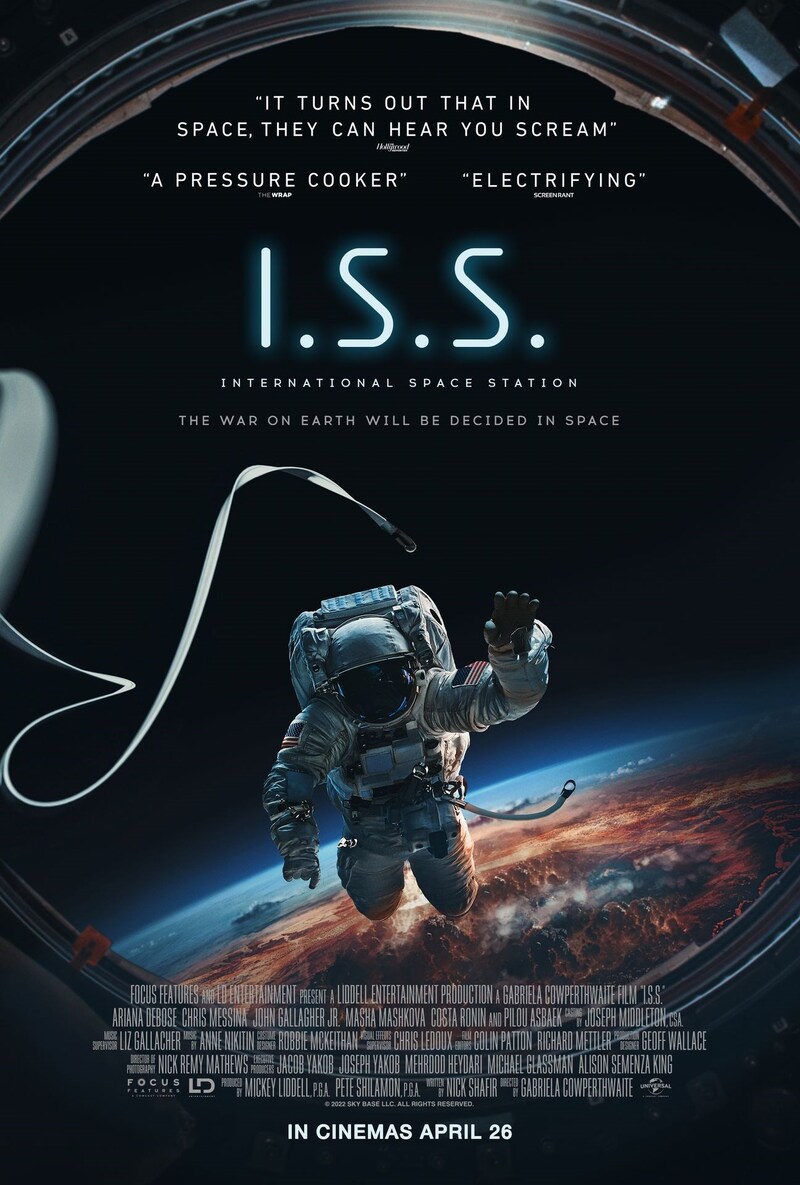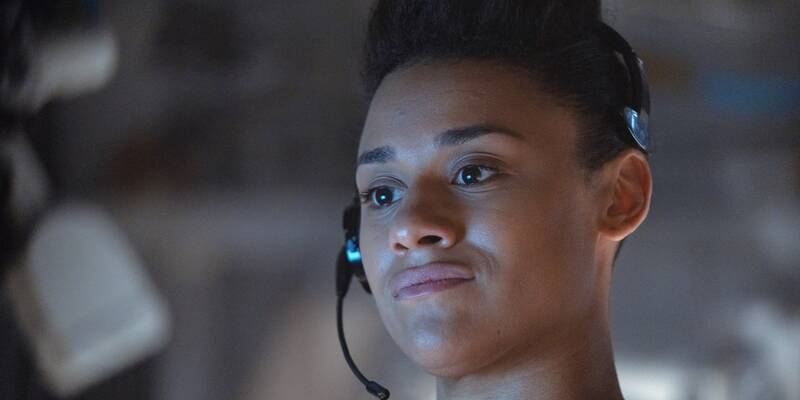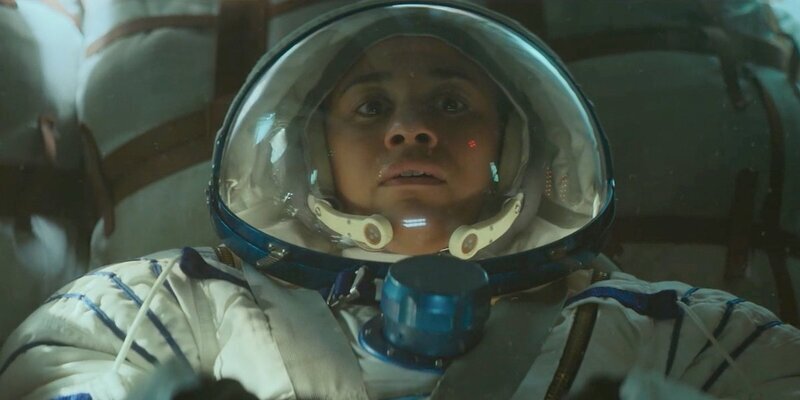
As nuclear war rages on Earth, the American and Russian crews of the
International Space Station are pitted against one another.
Review by
Eric Hillis
Directed by: Gabriela Cowperthwaite
Starring: Ariana DeBose, Chris Messina, Pilou Asbaek, John Gallagher Jr., Costa
Ronin, Masha Mashkova

The International Space Station is one of those rare examples where
nations can put aside their differences and work together towards a
common good (or a common bad even). While their leaders on the ground
butt heads, American astronauts and Russian cosmonauts work in harmony
in the heavens. Do they actually get along though? Or do both parties
begrudgingly accept that they have to work and live together?
I.S.S. gives us a crew of astronauts and cosmonauts who
enjoy a cordial relationship that even extends to a secret romance
between two parties. That's until a catastrophic event on Earth reminds
them that they're on opposing sides, and the tin can they so happily
shared becomes a battleground.

Astronauts Kira (Ariana DeBose) and Christian (John Gallagher Jr.) arrive at the ISS and are greeted by their American commanding
officer Gordon (Chris Messina) and their Russian opposites
Weronika (Masha Mashkova), Nicholai (Costa Ronin) and
Alexey (Pilou Asbaek). All six hit it off to varying degrees,
though Alexey is somewhat standoffish with his American colleagues. They
get drunk together on liquor that floats through the station in bubbles
and enjoy a rather on-the-nose singalong to The Scorpions' mullets and
lighters classic 'Wind of Change'. Gordon and Weronika make googly eyes
at one another. They all respect each other as professionals. Looking at
the Earth from above they note how there are no visible borders.
Weronika teaches Kira the Russian translation of "What's most important
is that we stick together."
This friendly dynamic falls apart when, just as in the cult '80s sci-fi
thriller
Def-Con 4, the ISS crew observes a nuclear war devastate the planet below. Both
parties receive the same command from their superiors: their nations are
now engaged in a full-on nuclear war and the station must be seized by
any means necessary.

It's often said of movies from 50+ years ago that "It wouldn't get made
now," but the same might be argued for I.S.S. The film was shot before Russia's invasion of Ukraine led to a
shunning of all things Russian in the western world, and its belated
release is likely a result of cold feet regarding how to market a movie
with sympathetic Russian characters. Had the film been made later it
probably wouldn't be hugely different, but there would certainly be
subtle distinctions. I imagine the Russian dialogue wouldn't be
subtitled, that the cosmonauts would be "othered" as one-note villains
in a way they aren't here. Director Gabriela Cowperthwaite and
writer Nick Shafir present both sides of this intimate conflict
as we're made privy to the secret conversations of both parties. There's
no consensus within either group as to whether they should obey their
orders. Some feel they can trust their opposites while others are
intensely paranoid, and in some cases it's this paranoia rather than any
real threat that leads to violence.
The film is guilty of indulging in some well-worn space movie tropes.
We get the obligatory scene where a crew member has to don a suit and
fix a fault on the outside of the station, but it lacks the suspense of
say the sabotage scene in 2001 because it comes at a point
where the true intentions of the opposing party haven't yet been made
clear. What we get is a shock rather than sustained suspense. We don't
know the bomb is under the table until it goes off. Hitchcock is
groaning in his grave. We also know that at some point the life support
systems will fail, leading to a countdown scenario.

Conversely there are some ideas that feel fresh, particularly regarding
the absence of gravity. There's a scene in which two crew members engage
in a fight armed with a drill and a knife, but the weightlessness makes
it extremely difficult to engage in a hand to hand brawl. At other
points however the film seems to conveniently forget about the gravity
issue: one scene builds tension regarding two parties eyeballing a
kitchen knife that somehow remains flat on a counter-top without
floating away.
I.S.S. does a good job of making us believe that highly
intelligent people are above the squabbles of their nations, but it's
not so convincing when it has to disrupt this dynamic. One of the
characters suddenly becomes a cold-hearted killer while another has a
highly unconvincing final act heel turn that's shoehorned in for the
sake of one last bit of conflict. The cast acquit themselves well and
it's refreshing to see Russians actually played by Russians (Asbaek
aside) in a western production. Ultimately however, for all the
commentary on the silliness of our earthly disputes,
I.S.S. descends into a rather by the numbers space
thriller.

I.S.S. is on UK/ROI VOD now.

